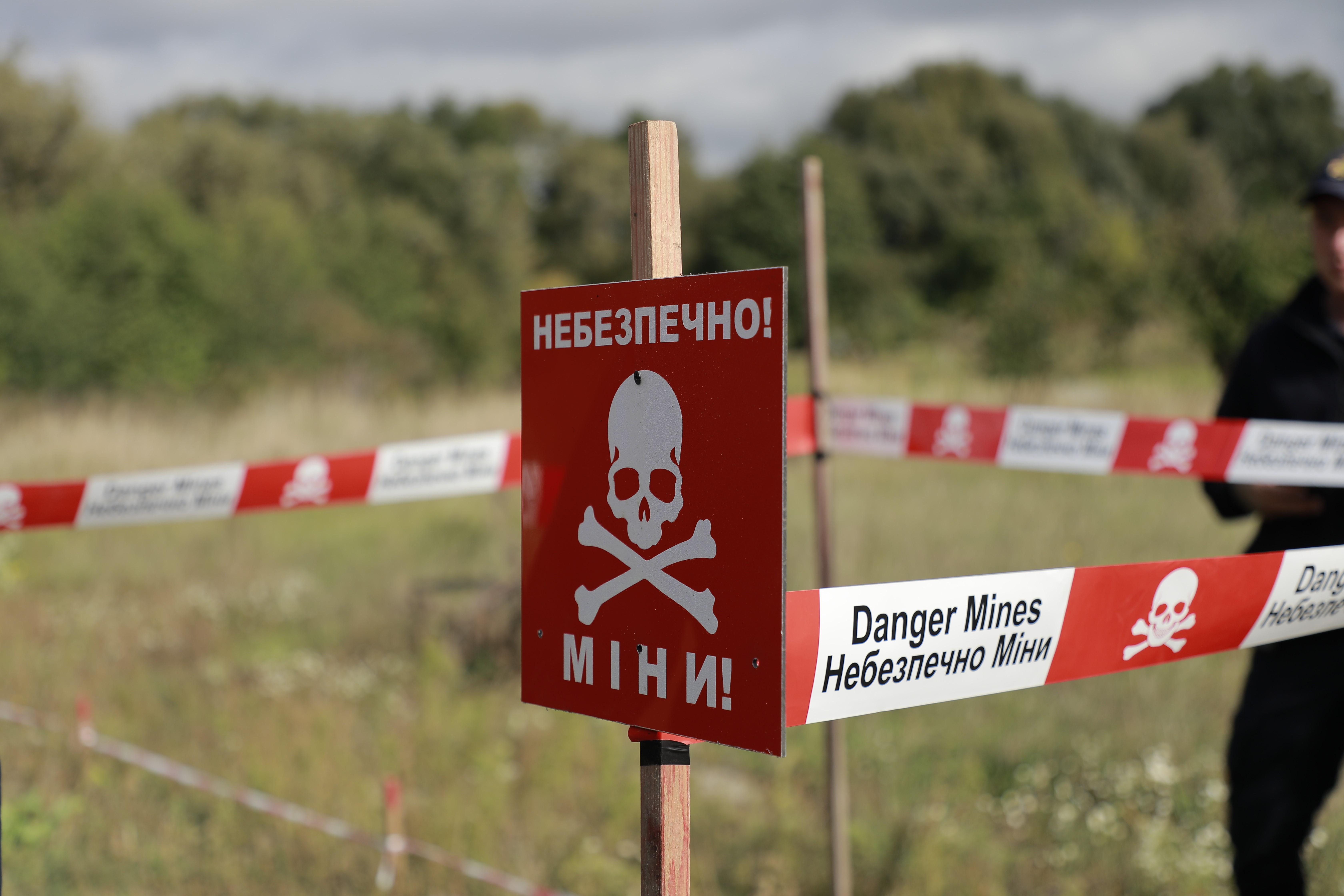A comprehensive nationwide campaign will educate, empower, and safeguard Ukrainian communities from the dangers of explosive ordnance
New UNDP and BBC Media Action campaign to raise awareness of dangers of explosive ordnance in Ukraine
April 3, 2024

A site potentially contaminated with explosive ordnance in the Ivankiv community, Kyiv Oblast, marked with a warning sign – October 2023.
Kyiv, 3 April 2024 – The United Nations Development Programme (UNDP) in Ukraine and BBC Media Action, supported by the Government of Japan, are proud to announce the launch of a campaign aimed at educating the population on the risks posed by explosive ordnance (EO) and promoting safe behaviour.
Developed in coordination with the State Emergency Service of Ukraine (SESU) and key non-governmental actors in the field, the campaign will target Ukraine’s population nationwide, with a particular focus on the demographics that are at the highest risk of EO-related accidents.
This comprehensive project consists of multiple phases, including:
- the dissemination of educational and behaviour-changing content;
- the enhancement of local media capacities to produce such content independently;
- study of population behaviour and content perception to inform future best practices.
The first phase of the campaign started in December 2023, with active content distribution through various channels - such as television, radio, social media platforms, and outdoor advertisements - scheduled to begin in June 2024.
At present, the project is in the process of conducting a nationwide survey, developing content, and working with local media. Notably, 13 journalists from media outlets in Mykolaiv and Donetsk oblasts have recently completed training sessions on Social and Behaviour Change Communication (SBCC),- and will receive ongoing guidance from industry experts.
UNDP Resident Representative in Ukraine Cilliers emphasized UNDP's dedication to mitigating explosive ordnance hazards across Ukraine. “Our focus is on promoting human security through various approaches, including equipping the population with tools for safe behaviour, and directly addressing explosive ordnance contamination through support to mine action efforts”, Cilliers said.
“Through UNDP’S collaboration with the BBC Media Action we aim to raise awareness, instigate behavioural change, and disseminate life-saving information across Ukraine’s communities.”
Olga Sedova, BBC Media Action Country Director for Eastern Europe and Central Asia, stressed that media have a unique ability to reach people quickly and at scale to help protect them from the dangers of unexploded ordnance.
“We are delighted to be working with UNDP, funded by the Government of Japan to train local media and support the creation of content that will help save lives,” Sedova said.
Matsuda Kuninori, Ambassador Extraordinary and Plenipotentiary of Japan to Ukraine, reiterated Japan's commitment to supporting Ukraine and its efforts to achieve a mine-free country. “The government and the people of Japan remain deeply committed to supporting Ukraine and its courageous citizens as they strive to overcome the challenges posed by landmines and explosive remnants of war,” he said.
“Educating the population about the risks posed by mine ordnance is the first step toward a safer future.”
Andrii Danyk, Acting Head of the State Emergency Service of Ukraine, emphasized the importance of carrying out educational activities with the population. “Explosive ordnance risk education is vital for reducing the risks of casualties amongst the population of Ukraine, which, unfortunately, is extremely vulnerable,” Danyk said. “In the most mine-polluted areas of Ukraine, even daily activities carry risks,” he said. “The most effective way to prevent casualties is to inform and educate the population, so they avoid risky behaviour – especially when it comes to the most heavily mined zones of Ukraine.”
Background: Ukraine is now one of the world’s most heavily mine-contaminated countries. In two years of full-scale war, landmines – along with unexploded bombs, artillery shells and other explosive remnants of war – have potentially contaminated almost a third of Ukraine’s territory. According to the SESU, as of the beginning of April 2024, 295 people lost their lives to incidents with explosive devices, and 663 were injured.
About BBC Media Action: BBC Media Action is the BBC’s international development organisation, working in more than 20 countries and reaching more than 100 million people a year. We support independent media and share trusted information that protects health and our planet, bridges divides, and saves and changes lives. We follow the editorial standards and values of the BBC, but we rely on donor funding to carry out our work. To find out more, please see bbcmediaaction.org.
Media enquiries:
Yuliia Samus, UNDP Ukraine Head of Communications; e-mail: yuliia.samus@undp.org
Carolynne Wheeler, BBC Media Action Head of Communications; e-mail: carolynne.wheeler@bbc.co.uk

 Locations
Locations



